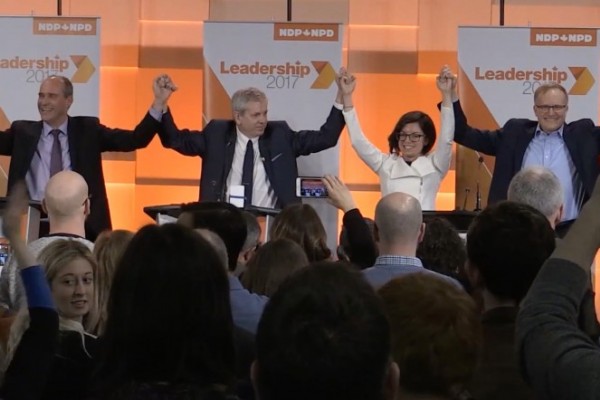-

One NDPer’s position on the leadership contest
This list and its rationale is my personal opinion and should be taken as such. Nevertheless, it is my hope that this helps participants shore up their list, even if they disagree with my ultimate interpretation. Any of the four hopefuls will make a great leader, and will have three people willing to help them implement their vision for a just Canada.
-

Sixth NDP leadership debate: Debates around CCF-NDP history and means testing generate conflict
This is a substantive political debate that will continue to play out throughout the rest of the contest, and raises an important question about how we classify and prioritize social spending, income transfers, and all those initiatives to reduce poverty and inequality. In various ways, all four candidates have offered new and transitioned programs to address poverty.
-

NDP leadership race: Labour-themed debate brings most substance yet
Much is still at stake for 2019, and while Trudeau remains strong, his father in 1972 lost his Trudeaumania majority, nearly lost power altogether, and had to depend on the David Lewis NDP to keep it. Even if 2019 doesn’t bring an NDPer into 24 Sussex, the chosen leader could wield immense power and influence.
-

Fourth NDP leadership debate: New format sparks real debate and discussion
While Westminster might feel awfully distant from Canada, the CCF-NDP and Canadian labour movement has been deeply influenced by Britain. Much like how the Labour Party provided examples to the CCF-NDP last century, so too can Corbyn provide a basic roadmap towards socialist relevance today. As with the previous recaps, we will look at each candidate individually before offering general closing remarks.
-

Third NDP leadership debate: Two new contestants and a bit more conflict
Ultimately, the debate was the most passionate one to date, and offered the biggest hints of disagreement and conflict between the six candidates. Nevertheless, the process was a cordial one, with contenders giving credit to one another for the work they had done on various key issues, and still beginning numerous points by agreeing with the previous speaker.
-

How will Jagmeet Singh shape the federal NDP leadership race?
The energy Singh brings, and the urgency he might be creating among other candidates, could bring a more competitive tone to the debates that have thus far lacked major differentiations between the candidates. With the CPC leadership race ending this week, the NDP leadership race will be getting increased attention, and is really just beginning.
-

The 2017 Ontario NDP convention: Lessons learned, steps forward
In June 2014, The Ontario NDP wrapped up a fairly disappointing election. While the results on the surface were acceptable for Andrea Horwath and the ONDP—maintaining their 2011 seat total, and adding one percent of the popular vote—the end result was a Liberal majority government built on the relative collapse of Progressive Conservative support, which was driven by strategic voters looking to reject the politics of extreme austerity.
-

Second NDP leadership debate: With youth issues as backdrop, differences start to emerge
This time around, the focus on youth issues showcased greater specificity, and thus brought out both different positions, along with divergent means to reach similar ends. The politics of pineapple pizza aside, even the ‘lightning round’ questions were more substantive this time. All of this means that an undecided NDP member was given some guidance about who they may support.
-

First NDP leadership debate: Good introduction, but not a lot of differentiation
How does Angus materialize his ‘got your back’ philosophy into a platform? How does Julian plan to address free post-secondary schooling in a federalist scheme that gives educational powers to the provinces? How will Ashton determine the parameters of her commitment to greater public ownership? And in what way will Caron structure a Basic Income to ensure working Canadians aren’t quagmired in greater inequality?
-

Justin Trudeau on electoral reform: Deception, cynicism, and misrepresentations
The year 2015 will be the last federal election under the First Past The Post (FPTP) electoral system. This was the promise Justin Trudeau made during the 2015 campaign. But Trudeau’s Liberals have abandoned this campaign plank, based on a cynical series of lies and misrepresentations of their own promise, along with what the actual effect of ER is.



